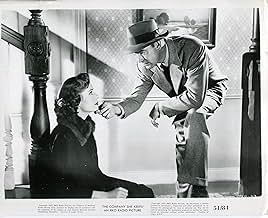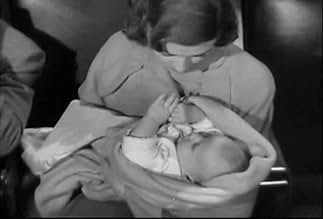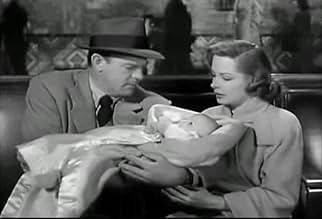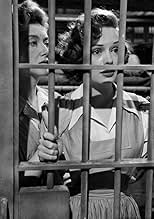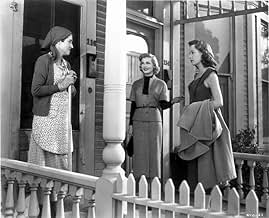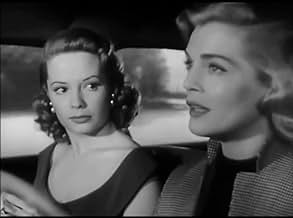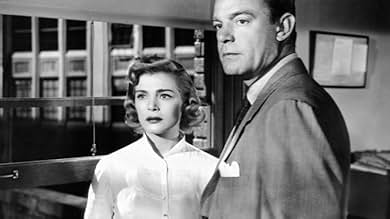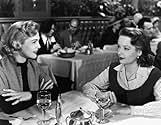VALUTAZIONE IMDb
6,3/10
673
LA TUA VALUTAZIONE
Aggiungi una trama nella tua linguaA female ex-convict meets a handsome man and they start dating, but she jeopardizes their relationship by not telling him that she was in prison--and he doesn't reveal his involvement with h... Leggi tuttoA female ex-convict meets a handsome man and they start dating, but she jeopardizes their relationship by not telling him that she was in prison--and he doesn't reveal his involvement with her parole officer.A female ex-convict meets a handsome man and they start dating, but she jeopardizes their relationship by not telling him that she was in prison--and he doesn't reveal his involvement with her parole officer.
- Regia
- Sceneggiatura
- Star
Eric Alden
- Sergeant of Detectives
- (non citato nei titoli originali)
Parley Baer
- Steve
- (non citato nei titoli originali)
Larry Barton
- Store Detective
- (non citato nei titoli originali)
June Benbow
- Myrtle
- (non citato nei titoli originali)
Lela Bliss
- Window Shopper
- (non citato nei titoli originali)
Gail Bonney
- Nurse
- (non citato nei titoli originali)
Recensioni in evidenza
The Company She Keeps might be viewed as John Cromwell's soft-hearted "sequel" to his great Caged of the same year (some of the same cast members reappear in small parts in both). Taking over the Eleanor Parker role -- the embittered parolee with a chip-on-the-shoulder attitude -- Jane Greer finally goes "freeside." Lizabeth Scott meets her at the train, not as a mentor into the world of vice but wasted as Greer's saintly parole officer. Greer makes it plain that she's none too happy with the constraints (a night-shift job, frumpy clothes, no drinking) imposed upon her, and promptly sets her hat for Scott's fiance Dennis O'Keefe, who tumbles right into it.
And this is where Ketti Frings' script loses whatever edge it had. The hard, manipulative Greer goes soft around the edges, conflicted and vacillating. Scott, meanwhile, magnanimously cedes O'Keefe to her rival and continues to advocate on her behalf with redoubled passion (an opposite change of heart would have furnished welcome friction).
Luckily, a few goblins still hover in the shadows, and, in a brief scene set in Los Angeles' municipal lockup, Cromwell manages to reprise some of the black magic of Caged. But the syrupy social messages and Frings' earnest kind-heartedness almost sink the movie, which nonetheless preserves one of Greer's rare appearances in the noir cycle, particularly savory at the movie's start and near its end. Just don't expect another Kathie Moffat from Out of the Past.
And this is where Ketti Frings' script loses whatever edge it had. The hard, manipulative Greer goes soft around the edges, conflicted and vacillating. Scott, meanwhile, magnanimously cedes O'Keefe to her rival and continues to advocate on her behalf with redoubled passion (an opposite change of heart would have furnished welcome friction).
Luckily, a few goblins still hover in the shadows, and, in a brief scene set in Los Angeles' municipal lockup, Cromwell manages to reprise some of the black magic of Caged. But the syrupy social messages and Frings' earnest kind-heartedness almost sink the movie, which nonetheless preserves one of Greer's rare appearances in the noir cycle, particularly savory at the movie's start and near its end. Just don't expect another Kathie Moffat from Out of the Past.
I fell for Lizabeth Scott in Too Late for Tears, and she's delicious here as a tortured altruist. But it's Jane Greer as the broken dove who has a the limelight for the first two acts. The shades of gray--and green--make this a juicy little melodrama for both characters. Indeed, the lesbian tension is palpable in the beginning (and I didn't know about Scott's reputation), suggesting much more than the film makers may have intended (but, oh, what a movie this COULD have been...). Dennis O'Keefe is the weak link, looking older than his 43 years and strolling thru scenes without adding much flavor. Fay Baker is a nice addition as the tough girl that Greer might have been without the help she gets.
When diane (jane freer) is released from prison, she has a hard time adjusting; her parole officer joan (lizabeth scott) does her best to help diane ease back into society, and a new job. And somehow goes on a date with her parole officer's boyfriend. But that huge chip on her shoulder keeps giving her away. She snaps at everyone, and blames others for her own insecurity. She's so determined to hide her parolee status that it ends up working against her. When joan's boyfriend falls for diane, it all hits the fan. How will diane, joan and larry deal with all this? Complicated. It all kind of plods along. It's all pretty unlikely, as these things go. Directed by john cromwell, who was caught up in the HUAC shenanigans in the 1940s, 1950s, rightly or wrongly. He made this film and "the racket" before he was suspended. He also specialized in fun adventures in exotic, far-away lands, which were usually the back lot. Story by ketti frings. Watchable, but not very exciting.
Lizabeth Scott is OK here, & I'm a big fan of hers, but I would have liked her better in the role of Diane (played by Greer). Scott is just too sugary sweet in her role as a Parole Officer Angel. On the other hand, I kept waiting for Greer's character to wake up & smell the coffee, but she really never did, & that's what makes this film a cut above similar soapers of this kind. Greer is excellent as a sneering, eye-rolling bad girl who just doesn't care about those trying to help her or society, & really doesn't even care about herself. I rate it 6/10. I would have rated it higher if not for Scott's too sweet character & the happy pat en
Parole officer (Scott) and parolee Diane (Greer) compete for the same man (O'Keefe), creating conflict on several levels. At best, the movie's about the difficulties of being on parole.
Oddball little programmer. Scott gets top billing, but as others point out, it's Greer who gets the screen time. And far from her usual slinky seductive role, she's not only de-glamorized, but also suitably dour-faced (just count her smiles; I stopped after one). All in all, it's a rather grim screenplay, drably photographed, and I can't believe the studio expected the final product to make money.
Despite the romantic triangle that strains believability, there are several striking scenes. Catch the iconic 40's diner where Diane gets her bottom-of-the-barrel meals. The sweat and steam just about drip off the wall. And that police line-up-- a graphic cross-section of the city's tough cookies, down-and-out'ers, and hopelessly pathetic (& one of the few barfing scenes from that era)-- are all herded along by a bullying cop (Freed). It's one of the more unvarnished glimpses of urban flotsam and jetsam from the period. Then there's the crowded jail cell where the camera abandons Diane (& us) to a nightmare of entrapment. It's an unnerving moment, very well done.
I would've liked the movie better had they made the triangle more credible, plus Scott's sacrificial character seems too good to be true. I expect the latter was RKO's effort at compensating for the harshness of the parole system as portrayed. Likely too, prestige producer John Houseman had something to do with the social realism phase, including the poignant overcoat episode. Anyway, reviewer bmacy's remarks on the influence of the previous year's Caged (1950) are on target. And, had this film carried through more with its realistic dimension, it might not be as obscure as it is.
Oddball little programmer. Scott gets top billing, but as others point out, it's Greer who gets the screen time. And far from her usual slinky seductive role, she's not only de-glamorized, but also suitably dour-faced (just count her smiles; I stopped after one). All in all, it's a rather grim screenplay, drably photographed, and I can't believe the studio expected the final product to make money.
Despite the romantic triangle that strains believability, there are several striking scenes. Catch the iconic 40's diner where Diane gets her bottom-of-the-barrel meals. The sweat and steam just about drip off the wall. And that police line-up-- a graphic cross-section of the city's tough cookies, down-and-out'ers, and hopelessly pathetic (& one of the few barfing scenes from that era)-- are all herded along by a bullying cop (Freed). It's one of the more unvarnished glimpses of urban flotsam and jetsam from the period. Then there's the crowded jail cell where the camera abandons Diane (& us) to a nightmare of entrapment. It's an unnerving moment, very well done.
I would've liked the movie better had they made the triangle more credible, plus Scott's sacrificial character seems too good to be true. I expect the latter was RKO's effort at compensating for the harshness of the parole system as portrayed. Likely too, prestige producer John Houseman had something to do with the social realism phase, including the poignant overcoat episode. Anyway, reviewer bmacy's remarks on the influence of the previous year's Caged (1950) are on target. And, had this film carried through more with its realistic dimension, it might not be as obscure as it is.
Lo sapevi?
- QuizAt one point, four month-old Jeff Bridges, playing the baby Jane Greer is holding in the train station, was supposed to cry. To get him to cry, Jeff's mother, Dorothy Dean Bridges, suggested they pinch him.
- ConnessioniFeatured in 2019 Golden Globe Awards (2019)
I più visti
Accedi per valutare e creare un elenco di titoli salvati per ottenere consigli personalizzati
- How long is The Company She Keeps?Powered by Alexa
Dettagli
- Data di uscita
- Paese di origine
- Lingua
- Celebre anche come
- The Company She Keeps
- Luoghi delle riprese
- 114-116 North Hope Street, Los Angeles, California, Stati Uniti(Diane Stuart's apartment building)
- Azienda produttrice
- Vedi altri crediti dell’azienda su IMDbPro
- Tempo di esecuzione1 ora 22 minuti
- Colore
- Proporzioni
- 1.37 : 1
Contribuisci a questa pagina
Suggerisci una modifica o aggiungi i contenuti mancanti

Divario superiore
By what name was N.N. vigilata speciale (1951) officially released in Canada in English?
Rispondi
